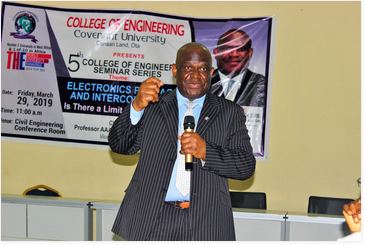One of the International Visiting Scholars to Covenant, Professor Nduka Ekere, has declared that the future of electronics packaging is spin-based electronics, which is aptly dubbed ‘Spintronics’.
He stated that since there was a limit to how big products could be made, there must also be a limit as to how small manufacturers could go. “In recent time, they are looking at another way of conducting electronics; it’s called spintronics, spin-based electronics. The future is spintronics,” he affirmed.
Professor Ekere, who is a Professor of Manufacturing Engineering at the University of Wolverhampton, UK, made this declaration on Friday, March 29, 2019, at the 5th College of Engineering Seminar, where he delivered a lecture with the topic, ‘Electronics Packaging and Interconnection: Is there a Limit to Miniaturisation?’
He posited that though technically challenging, miniaturisation had its benefits because making things smaller had its advantages. Miniaturisation, he said, had happened through two parallel lines, which included the top-down approach of semi-contractors and microelectronics, and the development of plasma silicon technology and the integration of components and functions.
While crediting the duo of Jack Kilby and Robert Noyce as the pioneer brains behind miniaturisation, he stated that the trend was about decreasing size and increasing performance, with miniaturisation entailing putting more and more component devices into smaller and smaller spaces. “The endless quest for mobility is a key driver for miniaturisation,” he said.
Professor Ekere buttressed his argument with the evolution of the cellular phone, which was from analog to digital. He stated that the evolution of electronic products in general had witnessed an exponential growth in the power of the chip, with cellphone miniaturisation facilitated by new packaging.
On the challenges of miniaturisation, the lecturer, who has published more than 170 research papers, noted that too many components by soldering could be a problem. He added that there was also the challenge of solving the problem of multi-functionality, reduction in size, weight and cost in terms of associated materials.
While raising a poser on how much smaller could the world go with conventional technology, Professor Ekere averred that since a key driver for miniaturisation was endless quest for mobility, there would be further market convergence, with spintronics as the future of electronic packaging.
Earlier in his welcome remarks, a senior faculty in the Department of Chemical Engineering, Professor James Omoleye, representing the Dean, College of Engineering, Professor David Omole, appreciated Professor Ekere for making himself available for the presentation at the seminar. He urged members of faculty, staff and students in attendance to pay attention so as to learn valuable lessons from the lecture.
Also, while giving the closing remarks, a senior faculty in the Department of Mechanical Engineering, Professor Anthony Inegbenebor, who described the lecture given by Professor Ekere as wonderful, thanked the Covenant Management for bringing him to the University. He hoped that the ideas espoused by the visiting scholar would spark something tangible in the Nigerian electronic industry.
Please refer to the link provided for Covenant University News :https://www.covenantuniversity.edu.ng/News


